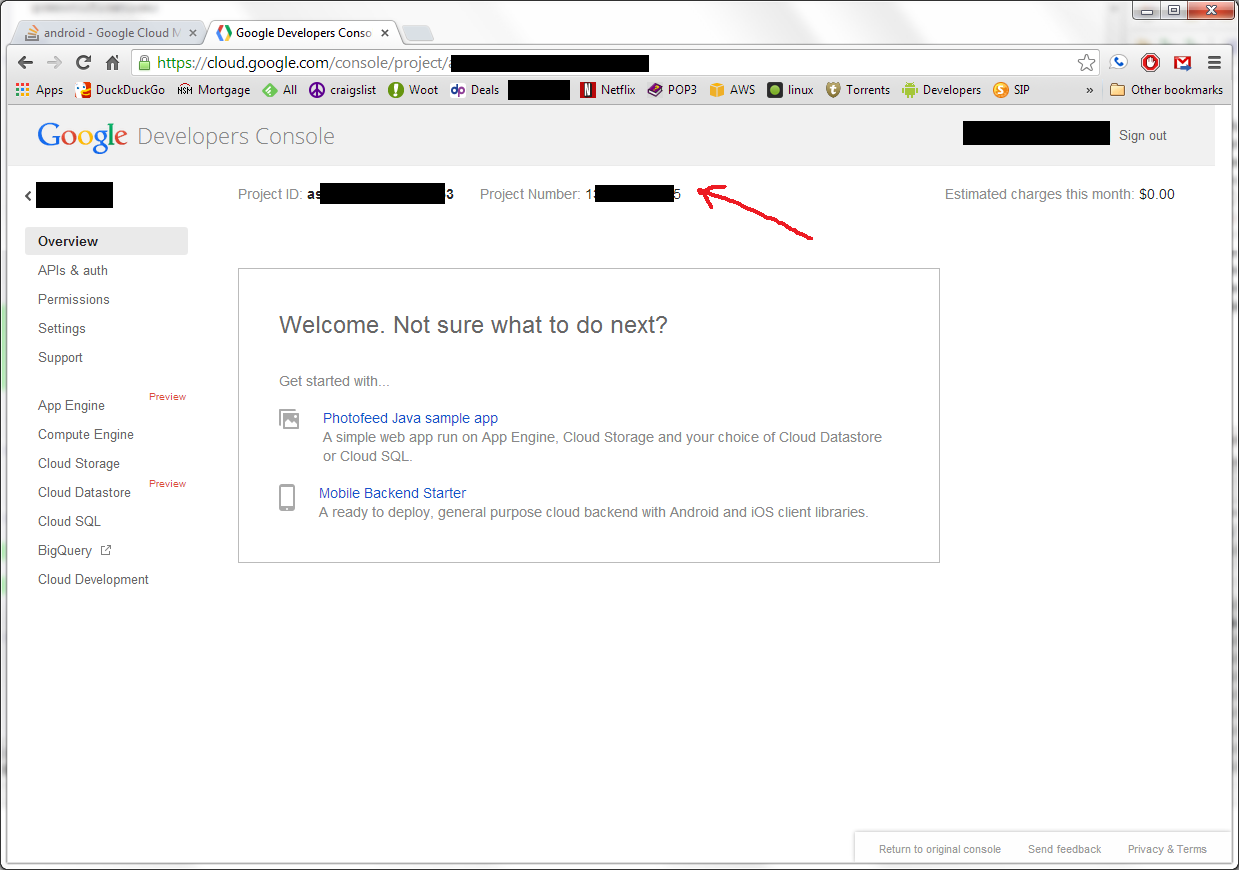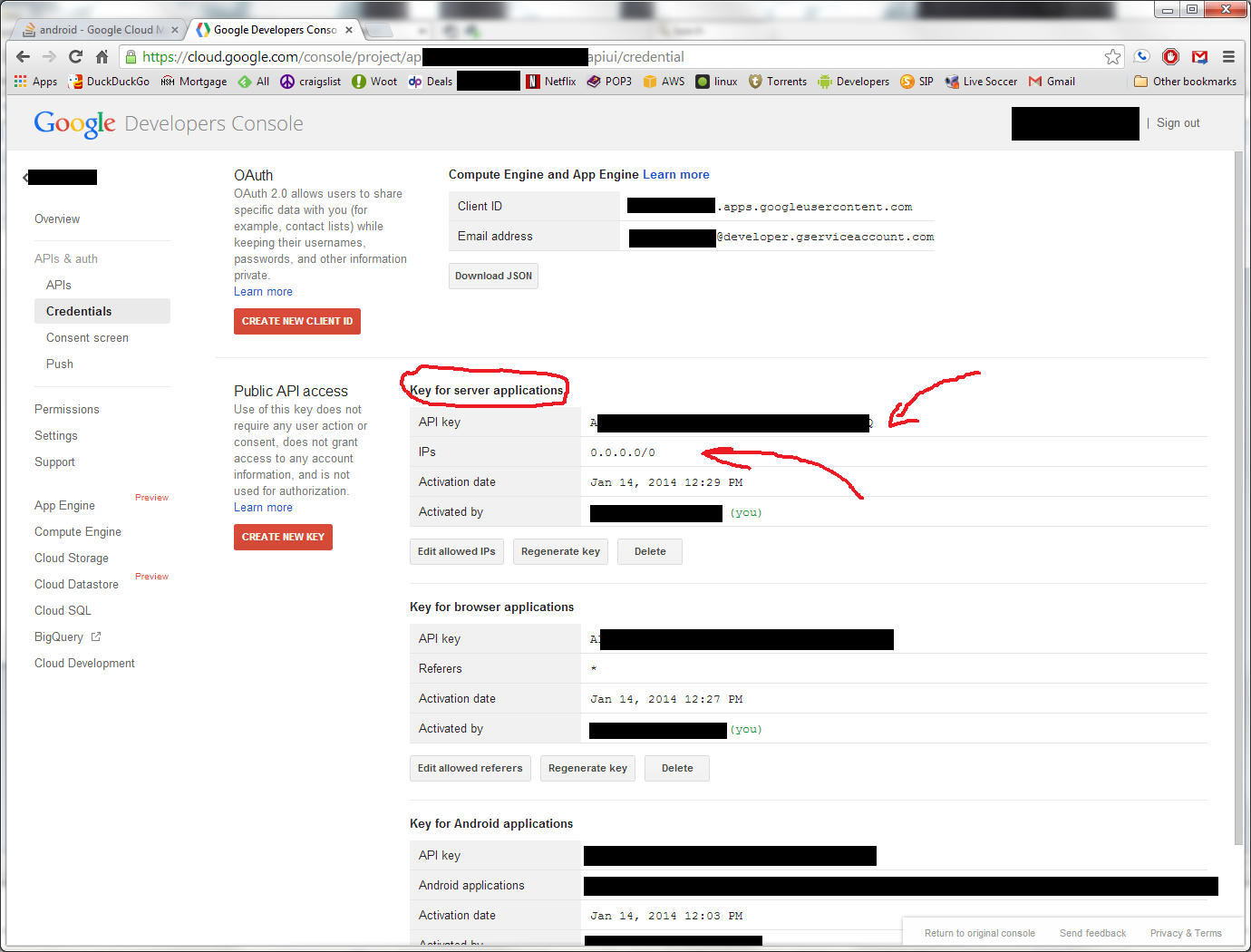Messagerie Google Cloud dans Delphi XE5?
j'ai une application android que je pense à transférer sur Delphi mais je ne vois pas de moyen d'interfacer avec GCM. Je pense que je devrais peut-être lancer le GCMBaseIntentService en java et l'interface avec l'objet partagé delphi?
alternativement, je cherche un moyen de faire des notifications push dans une application android Delphi Xe5.
4 réponses
vous interfacez Java avec Delphi en utilisant JNI. Le JNI vous permet d'appeler dans les deux sens: Java à Delphi ou Delphi à Java. Vous pouvez donc étendre vos applications Delphi avec cours de Java.
pour mettre en œuvre ce que vous voulez sur Android, le faire en Java sera le chemin le plus facile à suivre, car certains exemples disponibles font exactement ce que vous avez à l'esprit. Juste un coup d'oeil:
- la mise en Œuvre de Notification Push / Google Cloud Messaging pour Android
- Android* Application Client À L'Aide Basée Sur Le Cloud Service D'Alerte
- Github Gist-GCMIntentService.java
pour interfacer Java JNI et Delphi, vous pouvez suivre des étapes détaillées, permettant ainsi un communication fluide entre l'avant et l'arrière de votre application.
Si vous décidez de réutiliser une partie du code, n'oubliez pas de donner crédit à l'auteur.
je suis GCM de travail avec Delphi et j'ai fait un exemple de composant s'occuper de l'enregistrement et de la réception des messages GCM.
NOTE: c'est juste un code de test approximatif, Je ne l'utilise dans aucune application réelle (encore). N'hésitez pas à la modifier et de l'améliorer, et si vous trouvez des bugs, merci de poster en arrière.
un grand merci à Brian Long et à son article sur Services Android.
obtenez votre ID d'expéditeur GCM (il est votre numéro de projet depuis la console gcm) et votre ID D'API GCM (créez une clé pour l'application serveur dans la console GCM), vous en aurez besoin (voir les photos en bas).
tout d'Abord, vous avez besoin d'une modification de classes.dex fichier. Vous pouvez créer ce en exécutant le fichier bat Java dir dans l'archive, ou vous pouvez utiliser celui qui est déjà compilé par moi-même (également inclus dans l'archive).
Vous avez ajouter les nouvelles classes.dex à votre déploiement Android et UNCHECK l'embarcadero:
ensuite, vous devez éditer votre AndroidManifest.modèle.xml et ajouter juste après <%uses-permission%>:
<%uses-permission%>
<uses-permission android:name="com.google.android.c2dm.permission.RECEIVE" />
et juste après la balise android:theme="%theme%">
<receiver
android:name="com.ioan.delphi.GCMReceiver"
android:permission="com.google.android.c2dm.permission.SEND" >
<intent-filter>
<action android:name="com.google.android.c2dm.intent.RECEIVE" />
<category android:name="%package%" />
</intent-filter>
</receiver>
dans votre demande, déclarez l'Unité de notification GCM:
uses
gcmnotification;
et ensuite dans votre forme déclarez une variable du type de notification TGCMNotification et une procédure que vous lierez à la TGCMNotification.OnReceiveGCMNotification de l'événement:
type
TForm8 = class(TForm)
//....
private
{ Private declarations }
public
{ Public declarations }
gcmn: TGCMNotification;
procedure OnNotification(Sender: TObject; ANotification: TGCMNotificationMessage);
end;
procedure TForm8.FormCreate(Sender: TObject);
begin
gcmn := TGCMNotification.Create(self);
gcmn.OnReceiveGCMNotification := OnNotification;
end;
inscrivez le numéro de votre projet GCM dans le SenderID. Pour vous inscrire à L'application GCM, appelez DoRegister:
procedure TForm8.Button1Click(Sender: TObject);
begin
gcmn.SenderID := YOUR_GCM_SENDERID;
if gcmn.DoRegister then
Toast('Successfully registered with GCM.');
end;
si le DoRegister retourne true (enregistré avec succès), gcmn.RegistrationID aura l'ID unique dont vous avez besoin pour envoyer des messages à cet appareil.
Et vous recevrez des messages dans la procédure d'événement:
procedure TForm8.OnNotification(Sender: TObject; ANotification: TGCMNotificationMessage);
begin
Memo1.Lines.Add('Received: ' + ANotification.Body);
end;
.. et c'est vous en avez besoin pour Recevoir. Cool, hein? : -)
Pour envoyer, il suffit d'utiliser TIdHttp:
procedure TForm8.Button2Click(Sender: TObject);
const
sendUrl = 'https://android.googleapis.com/gcm/send';
var
Params: TStringList;
AuthHeader: STring;
idHTTP: TIDHTTP;
SSLIOHandler: TIdSSLIOHandlerSocketOpenSSL;
begin
idHTTP := TIDHTTP.Create(nil);
try
SslIOHandler := TIdSSLIOHandlerSocketOpenSSL.Create(nil);
idHTTP.IOHandler := SSLIOHandler;
idHTTP.HTTPOptions := [];
Params := TStringList.Create;
try
Params.Add('registration_id='+ gcmn.RegistrationID);
Params.Values['data.message'] := 'test: ' + FormatDateTime('yy-mm-dd hh:nn:ss', Now);
idHTTP.Request.Host := sendUrl;
AuthHeader := 'Authorization: key=' + YOUR_API_ID;
idHTTP.Request.CustomHeaders.Add(AuthHeader);
IdHTTP.Request.ContentType := 'application/x-www-form-urlencoded;charset=UTF-8';
Memo1.Lines.Add('Send result: ' + idHTTP.Post(sendUrl, Params));
finally
Params.Free;
end;
finally
FreeAndNil(idHTTP);
end;
end;
ensuite je vais poster les unités dont vous avez besoin, il suffit de les enregistrer au même endroit avec votre application (ou tout simplement télécharger le tout à partir de ici).
gcmnotification.pas
unit gcmnotification;
interface
{$IFDEF ANDROID}
uses
System.SysUtils,
System.Classes,
FMX.Helpers.Android,
Androidapi.JNI.PlayServices,
Androidapi.JNI.GraphicsContentViewText,
Androidapi.JNIBridge,
Androidapi.JNI.JavaTypes;
type
TGCMNotificationMessageKind = (nmMESSAGE_TYPE_MESSAGE, nmMESSAGE_TYPE_DELETED, nmMESSAGE_TYPE_SEND_ERROR);
{ Discription of notification for Notification Center }
TGCMNotificationMessage = class (TPersistent)
private
FKind: TGCMNotificationMessageKind;
FSender: string;
FWhat: integer;
FBody: string;
protected
procedure AssignTo(Dest: TPersistent); override;
public
{ Unique identificator for determenation notification in Notification list }
property Kind: TGCMNotificationMessageKind read FKind write FKind;
property Sender: string read FSender write FSender;
property What: integer read FWhat write FWhat;
property Body: string read FBody write FBody;
constructor Create;
end;
TOnReceiveGCMNotification = procedure (Sender: TObject; ANotification: TGCMNotificationMessage) of object;
TGCMNotification = class(TComponent)
strict private
{ Private declarations }
FRegistrationID: string;
FSenderID: string;
FOnReceiveGCMNotification: TOnReceiveGCMNotification;
FReceiver: JBroadcastReceiver;
FAlreadyRegistered: boolean;
function CheckPlayServicesSupport: boolean;
protected
{ Protected declarations }
public
{ Public declarations }
constructor Create(AOwner: TComponent); override;
destructor Destroy; override;
function DoRegister: boolean;
function GetGCMInstance: JGoogleCloudMessaging;
published
{ Published declarations }
property SenderID: string read FSenderID write FSenderID;
property RegistrationID: string read FRegistrationID write FRegistrationID;
property OnReceiveGCMNotification: TOnReceiveGCMNotification read FOnReceiveGCMNotification write FOnReceiveGCMNotification;
end;
{$ENDIF}
implementation
{$IFDEF ANDROID}
uses
uGCMReceiver;
{ TGCMNotification }
function TGCMNotification.CheckPlayServicesSupport: boolean;
var
resultCode: integer;
begin
resultCode := TJGooglePlayServicesUtil.JavaClass.isGooglePlayServicesAvailable(SharedActivity);
result := (resultCode = TJConnectionResult.JavaClass.SUCCESS);
end;
constructor TGCMNotification.Create(AOwner: TComponent);
var
Filter: JIntentFilter;
begin
inherited;
Filter := TJIntentFilter.Create;
FReceiver := TJGCMReceiver.Create(Self);
SharedActivity.registerReceiver(FReceiver, Filter);
FAlreadyRegistered := false;
end;
destructor TGCMNotification.Destroy;
begin
SharedActivity.unregisterReceiver(FReceiver);
FReceiver := nil;
inherited;
end;
function TGCMNotification.DoRegister: boolean;
var
p: TJavaObjectArray<JString>;
gcm: JGoogleCloudMessaging;
begin
if FAlreadyRegistered then
result := true
else
begin
if CheckPlayServicesSupport then
begin
gcm := GetGCMInstance;
p := TJavaObjectArray<JString>.Create(1);
p.Items[0] := StringToJString(FSenderID);
FRegistrationID := JStringToString(gcm.register(p));
FAlreadyRegistered := (FRegistrationID <> '');
result := FAlreadyRegistered;
end
else
result := false;
end;
end;
function TGCMNotification.GetGCMInstance: JGoogleCloudMessaging;
begin
result := TJGoogleCloudMessaging.JavaClass.getInstance(SharedActivity.getApplicationContext);
end;
{ TGCMNotificationMessage }
procedure TGCMNotificationMessage.AssignTo(Dest: TPersistent);
var
DestNotification: TGCMNotificationMessage;
begin
if Dest is TGCMNotificationMessage then
begin
DestNotification := Dest as TGCMNotificationMessage;
DestNotification.Kind := Kind;
DestNotification.What := What;
DestNotification.Sender := Sender;
DestNotification.Body := Body;
end
else
inherited AssignTo(Dest);
end;
constructor TGCMNotificationMessage.Create;
begin
Body := '';
end;
{$ENDIF}
end.
uGCMReceiver.pas
unit uGCMReceiver;
interface
{$IFDEF ANDROID}
uses
FMX.Types,
Androidapi.JNIBridge,
Androidapi.JNI.GraphicsContentViewText,
gcmnotification;
type
JGCMReceiverClass = interface(JBroadcastReceiverClass)
['{9D967671-9CD8-483A-98C8-161071CE7B64}']
{Methods}
end;
[JavaSignature('com/ioan/delphi/GCMReceiver')]
JGCMReceiver = interface(JBroadcastReceiver)
['{4B30D537-5221-4451-893D-7916ED11CE1F}']
{Methods}
end;
TJGCMReceiver = class(TJavaGenericImport<JGCMReceiverClass, JGCMReceiver>)
private
FOwningComponent: TGCMNotification;
protected
constructor _Create(AOwner: TGCMNotification);
public
class function Create(AOwner: TGCMNotification): JGCMReceiver;
procedure OnReceive(Context: JContext; ReceivedIntent: JIntent);
end;
{$ENDIF}
implementation
{$IFDEF ANDROID}
uses
System.Classes,
System.SysUtils,
FMX.Helpers.Android,
Androidapi.NativeActivity,
Androidapi.JNI,
Androidapi.JNI.JavaTypes,
Androidapi.JNI.Os,
Androidapi.JNI.PlayServices;
{$REGION 'JNI setup code and callback'}
var
GCMReceiver: TJGCMReceiver;
ARNContext: JContext;
ARNReceivedIntent: JIntent;
procedure GCMReceiverOnReceiveThreadSwitcher;
begin
Log.d('+gcmReceiverOnReceiveThreadSwitcher');
Log.d('Thread: Main: %.8x, Current: %.8x, Java:%.8d (%2:.8x)',
[MainThreadID, TThread.CurrentThread.ThreadID,
TJThread.JavaClass.CurrentThread.getId]);
GCMReceiver.OnReceive(ARNContext,ARNReceivedIntent );
Log.d('-gcmReceiverOnReceiveThreadSwitcher');
end;
//This is called from the Java activity's onReceiveNative() method
procedure GCMReceiverOnReceiveNative(PEnv: PJNIEnv; This: JNIObject; JNIContext, JNIReceivedIntent: JNIObject); cdecl;
begin
Log.d('+gcmReceiverOnReceiveNative');
Log.d('Thread: Main: %.8x, Current: %.8x, Java:%.8d (%2:.8x)',
[MainThreadID, TThread.CurrentThread.ThreadID,
TJThread.JavaClass.CurrentThread.getId]);
ARNContext := TJContext.Wrap(JNIContext);
ARNReceivedIntent := TJIntent.Wrap(JNIReceivedIntent);
Log.d('Calling Synchronize');
TThread.Synchronize(nil, GCMReceiverOnReceiveThreadSwitcher);
Log.d('Synchronize is over');
Log.d('-gcmReceiverOnReceiveNative');
end;
procedure RegisterDelphiNativeMethods;
var
PEnv: PJNIEnv;
ReceiverClass: JNIClass;
NativeMethod: JNINativeMethod;
begin
Log.d('Starting the GCMReceiver JNI stuff');
PEnv := TJNIResolver.GetJNIEnv;
Log.d('Registering interop methods');
NativeMethod.Name := 'gcmReceiverOnReceiveNative';
NativeMethod.Signature := '(Landroid/content/Context;Landroid/content/Intent;)V';
NativeMethod.FnPtr := @GCMReceiverOnReceiveNative;
ReceiverClass := TJNIResolver.GetJavaClassID('com.ioan.delphi.GCMReceiver');
PEnv^.RegisterNatives(PEnv, ReceiverClass, @NativeMethod, 1);
PEnv^.DeleteLocalRef(PEnv, ReceiverClass);
end;
{$ENDREGION}
{ TActivityReceiver }
constructor TJGCMReceiver._Create(AOwner: TGCMNotification);
begin
inherited;
FOwningComponent := AOwner;
Log.d('TJGCMReceiver._Create constructor');
end;
class function TJGCMReceiver.Create(AOwner: TGCMNotification): JGCMReceiver;
begin
Log.d('TJGCMReceiver.Create class function');
Result := inherited Create;
GCMReceiver := TJGCMReceiver._Create(AOwner);
end;
procedure TJGCMReceiver.OnReceive(Context: JContext; ReceivedIntent: JIntent);
var
extras: JBundle;
gcm: JGoogleCloudMessaging;
messageType: JString;
noti: TGCMNotificationMessage;
begin
if Assigned(FOwningComponent.OnReceiveGCMNotification) then
begin
noti := TGCMNotificationMessage.Create;
try
Log.d('Received a message!');
extras := ReceivedIntent.getExtras();
gcm := FOwningComponent.GetGCMInstance;
// The getMessageType() intent parameter must be the intent you received
// in your BroadcastReceiver.
messageType := gcm.getMessageType(ReceivedIntent);
if not extras.isEmpty() then
begin
{*
* Filter messages based on message type. Since it is likely that GCM will be
* extended in the future with new message types, just ignore any message types you're
* not interested in, or that you don't recognize.
*}
if TJGoogleCloudMessaging.JavaClass.MESSAGE_TYPE_SEND_ERROR.equals(messageType) then
begin
// It's an error.
noti.Kind := TGCMNotificationMessageKind.nmMESSAGE_TYPE_SEND_ERROR;
FOwningComponent.OnReceiveGCMNotification(Self, noti);
end
else
if TJGoogleCloudMessaging.JavaClass.MESSAGE_TYPE_DELETED.equals(messageType) then
begin
// Deleted messages on the server.
noti.Kind := TGCMNotificationMessageKind.nmMESSAGE_TYPE_DELETED;
FOwningComponent.OnReceiveGCMNotification(Self, noti);
end
else
if TJGoogleCloudMessaging.JavaClass.MESSAGE_TYPE_MESSAGE.equals(messageType) then
begin
// It's a regular GCM message, do some work.
noti.Kind := TGCMNotificationMessageKind.nmMESSAGE_TYPE_MESSAGE;
noti.Sender := JStringToString(extras.getString(StringToJString('sender')));
noti.What := StrToIntDef(JStringToString(extras.getString(StringToJString('what'))), 0);
noti.Body := JStringToString(extras.getString(StringToJString('message')));
FOwningComponent.OnReceiveGCMNotification(Self, noti);
end;
end;
finally
noti.Free;
end;
end;
end;
initialization
RegisterDelphiNativeMethods
{$ENDIF}
end.
Voici L'AndroidManifest modifié.modèle.xml
<?xml version="1.0" encoding="utf-8"?>
<!-- BEGIN_INCLUDE(manifest) -->
<manifest xmlns:android="http://schemas.android.com/apk/res/android"
package="%package%"
android:versionCode="%versionCode%"
android:versionName="%versionName%">
<!-- This is the platform API where NativeActivity was introduced. -->
<uses-sdk android:minSdkVersion="%minSdkVersion%" />
<%uses-permission%>
<uses-permission android:name="com.google.android.c2dm.permission.RECEIVE" />
<application android:persistent="%persistent%"
android:restoreAnyVersion="%restoreAnyVersion%"
android:label="%label%"
android:installLocation="%installLocation%"
android:debuggable="%debuggable%"
android:largeHeap="%largeHeap%"
android:icon="%icon%"
android:theme="%theme%">
<receiver
android:name="com.ioan.delphi.GCMReceiver"
android:permission="com.google.android.c2dm.permission.SEND" >
<intent-filter>
<action android:name="com.google.android.c2dm.intent.RECEIVE" />
<category android:name="%package%" />
</intent-filter>
</receiver>
<!-- Our activity is a subclass of the built-in NativeActivity framework class.
This will take care of integrating with our NDK code. -->
<activity android:name="com.embarcadero.firemonkey.FMXNativeActivity"
android:label="%activityLabel%"
android:configChanges="orientation|keyboardHidden">
<!-- Tell NativeActivity the name of our .so -->
<meta-data android:name="android.app.lib_name"
android:value="%libNameValue%" />
<intent-filter>
<action android:name="android.intent.action.MAIN" />
<category android:name="android.intent.category.LAUNCHER" />
</intent-filter>
</activity>
<receiver android:name="com.embarcadero.firemonkey.notifications.FMXNotificationAlarm" />
</application>
</manifest>
<!-- END_INCLUDE(manifest) -->
et la source complète pour le test application (il va envoyer et recevoir des GCM message):
unit testgcmmain;
interface
uses
System.SysUtils, System.Types, System.UITypes, System.Classes, System.Variants,
FMX.Types, FMX.Controls, FMX.Forms, FMX.Graphics, FMX.Dialogs,
FMX.StdCtrls, FMX.Layouts, FMX.Memo, IdBaseComponent, IdComponent, IdTCPConnection,
IdTCPClient, IdHTTP, IdIOHandler, IdIOHandlerSocket, IdIOHandlerStack, IdSSL, IdSSLOpenSSL,
gcmnotification;
type
TForm8 = class(TForm)
Button1: TButton;
Memo1: TMemo;
Button2: TButton;
procedure Button1Click(Sender: TObject);
procedure FormCreate(Sender: TObject);
procedure FormDestroy(Sender: TObject);
procedure Button2Click(Sender: TObject);
private
{ Private declarations }
public
{ Public declarations }
gcmn: TGCMNotification;
procedure OnNotification(Sender: TObject; ANotification: TGCMNotificationMessage);
end;
const
YOUR_GCM_SENDERID = '1234567890';
YOUR_API_ID = 'abc1234567890';
var
Form8: TForm8;
implementation
{$R *.fmx}
procedure TForm8.FormCreate(Sender: TObject);
begin
gcmn := TGCMNotification.Create(self);
gcmn.OnReceiveGCMNotification := OnNotification;
end;
procedure TForm8.FormDestroy(Sender: TObject);
begin
FreeAndNil(gcmn);
end;
procedure TForm8.Button1Click(Sender: TObject);
begin
// register with the GCM
gcmn.SenderID := YOUR_GCM_SENDERID;
if gcmn.DoRegister then
Memo1.Lines.Add('Successfully registered with GCM.');
end;
procedure TForm8.OnNotification(Sender: TObject; ANotification: TGCMNotificationMessage);
begin
// you just received a message!
if ANotification.Kind = TGCMNotificationMessageKind.nmMESSAGE_TYPE_MESSAGE then
Memo1.Lines.Add('Received: ' + ANotification.Body);
end;
// send a message
procedure TForm8.Button2Click(Sender: TObject);
const
sendUrl = 'https://android.googleapis.com/gcm/send';
var
Params: TStringList;
AuthHeader: STring;
idHTTP: TIDHTTP;
SSLIOHandler: TIdSSLIOHandlerSocketOpenSSL;
begin
idHTTP := TIDHTTP.Create(nil);
try
SslIOHandler := TIdSSLIOHandlerSocketOpenSSL.Create(nil);
idHTTP.IOHandler := SSLIOHandler;
idHTTP.HTTPOptions := [];
Params := TStringList.Create;
try
Params.Add('registration_id='+ gcmn.RegistrationID);
// you can send the data with a payload, in my example the server will accept
// data.message = the message you want to send
// data.sender = some sender info
// data.what = an integer (aka "message type")
// you can put any payload in the data, data.score, data.blabla...
// just make sure you modify the code in my component to handle it
Params.Values['data.message'] := 'test: ' + FormatDateTime('yy-mm-dd hh:nn:ss', Now);
idHTTP.Request.Host := sendUrl;
AuthHeader := 'Authorization: key=' + YOUR_API_ID;
idHTTP.Request.CustomHeaders.Add(AuthHeader);
IdHTTP.Request.ContentType := 'application/x-www-form-urlencoded;charset=UTF-8';
Memo1.Lines.Add('Send result: ' + idHTTP.Post(sendUrl, Params));
finally
Params.Free;
end;
finally
FreeAndNil(idHTTP);
end;
end;
end.
The GCMReceiver.java que vous devez compiler et Ajouter aux classes.dex est:
package com.ioan.delphi;
import android.content.BroadcastReceiver;
import android.content.Intent;
import android.content.Context;
import android.util.Log;
public class GCMReceiver extends BroadcastReceiver
{
static final String TAG = "GCMReceiver";
public native void gcmReceiverOnReceiveNative(Context context, Intent receivedIntent);
@Override
public void onReceive(Context context, Intent receivedIntent)
{
Log.d(TAG, "onReceive");
gcmReceiverOnReceiveNative(context, receivedIntent);
}
}
Et voici l'archive zip avec la source.
si vous avez du mal à le faire fonctionner, c'est probablement quelque chose qui n'est pas configuré directement dans votre console GCM.
voici ce qu'il vous faut de votre console GCM:
Projet (vous l'utilisez lorsque vous vous enregistrez avec GCM, placez-le dans la notification Tgcmno.SenderID avant D'appeler DoRegister).
API ID vous allez utiliser ceci pour envoyer des messages aux appareils enregistrés.
je pense que créer un pont vers Java pourrait être une bonne idée. Jetez un oeil à post sur la façon de le faire. Et ici vous pouvez trouver un tutoriel pour l'implémentation de client side GCM en Java.
je suis heureux de voir que delphi évolue et s'adapte aux besoins actuels. Le post m'a fait bibelots alors, j'ai cherché un peu je suis donc venu sur ces ressources:
post sur le forum sur embarcadero qui recommande datasnap pour résoudre le problème de communication entre GCM et la partie delphi.
j'espère que cela aidera quelqu'un.


